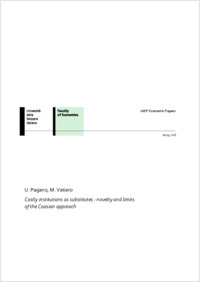Costly institutions as substitutes : novelty and limits of the Coasian approach
- Pagano, Ugo University of Siena, Italy
- Vatiero, Massimiliano Istituto di economia politica (IdEP), Facoltà di scienze economiche, Università della Svizzera italiana, Svizzera
-
2014
13 p.
English
One of the main contributions of Ronald H. Coase was to demonstrate how mainstream economics was based on a contradictory amalgam of costly physical inputs and free institutional resources, and to gave origin the economics of institutions: each institution is a mode of allocation and organization of economic resources that is to be investigated. In particular, none of the institutions (including the market) is a free lunch. The Coasian approach regards institutions as costly substitutes and provides a fundamental starting point for comparative institutional analysis. However, Coase neglected two issues deriving from the observation that institutions are not cost-free. First, when institutions are costly, one should not only consider their possible substitutes but also how complementary institutions affect their costs, as well as the costs of the possible institutional substitutes. Secondly, the economic analysis should also take into account that the transition from one institutional setup to another cannot occur in costless meta-institutions. The initial conditions may substantially affect the final institutional arrangements. Both the novelty of Coase’s approach and its limits were grossly undervalued. The costly institutions assumption requires a view of economics as a historical discipline.
- Language
-
- English
- Classification
- Economics
- License
-
License undefined
- Open access status
- green
- Identifiers
-
- RERO DOC 211141
- ARK ark:/12658/srd1318469
- Persistent URL
- https://n2t.net/ark:/12658/srd1318469
Statistics
Document views: 179
File downloads:
- Texte intégral: 259
